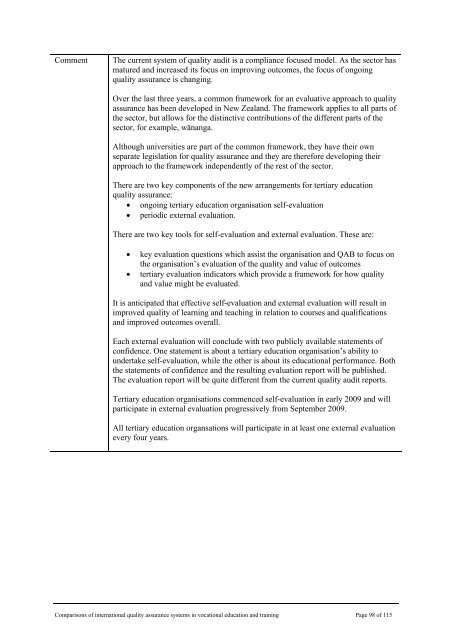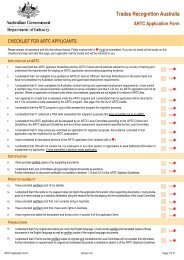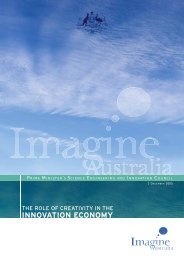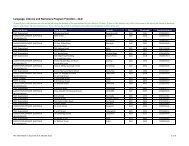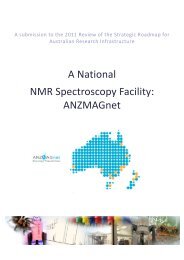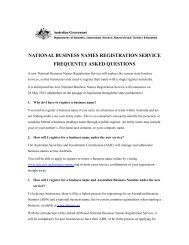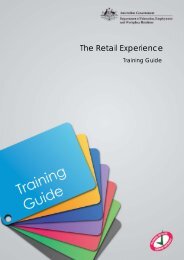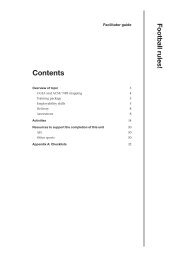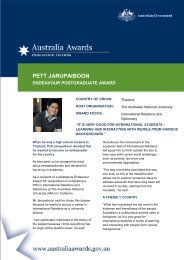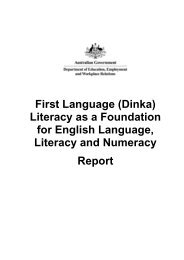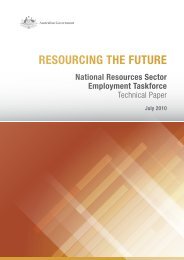Review - Department of Innovation, Industry, Science and Research
Review - Department of Innovation, Industry, Science and Research
Review - Department of Innovation, Industry, Science and Research
Create successful ePaper yourself
Turn your PDF publications into a flip-book with our unique Google optimized e-Paper software.
Comment<br />
The current system <strong>of</strong> quality audit is a compliance focused model. As the sector has<br />
matured <strong>and</strong> increased its focus on improving outcomes, the focus <strong>of</strong> ongoing<br />
quality assurance is changing.<br />
Over the last three years, a common framework for an evaluative approach to quality<br />
assurance has been developed in New Zeal<strong>and</strong>. The framework applies to all parts <strong>of</strong><br />
the sector, but allows for the distinctive contributions <strong>of</strong> the different parts <strong>of</strong> the<br />
sector, for example, wānanga.<br />
Although universities are part <strong>of</strong> the common framework, they have their own<br />
separate legislation for quality assurance <strong>and</strong> they are therefore developing their<br />
approach to the framework independently <strong>of</strong> the rest <strong>of</strong> the sector.<br />
There are two key components <strong>of</strong> the new arrangements for tertiary education<br />
quality assurance:<br />
• ongoing tertiary education organisation self-evaluation<br />
• periodic external evaluation.<br />
There are two key tools for self-evaluation <strong>and</strong> external evaluation. These are:<br />
• key evaluation questions which assist the organisation <strong>and</strong> QAB to focus on<br />
the organisation’s evaluation <strong>of</strong> the quality <strong>and</strong> value <strong>of</strong> outcomes<br />
• tertiary evaluation indicators which provide a framework for how quality<br />
<strong>and</strong> value might be evaluated.<br />
It is anticipated that effective self-evaluation <strong>and</strong> external evaluation will result in<br />
improved quality <strong>of</strong> learning <strong>and</strong> teaching in relation to courses <strong>and</strong> qualifications<br />
<strong>and</strong> improved outcomes overall.<br />
Each external evaluation will conclude with two publicly available statements <strong>of</strong><br />
confidence. One statement is about a tertiary education organisation’s ability to<br />
undertake self-evaluation, while the other is about its educational performance. Both<br />
the statements <strong>of</strong> confidence <strong>and</strong> the resulting evaluation report will be published.<br />
The evaluation report will be quite different from the current quality audit reports.<br />
Tertiary education organisations commenced self-evaluation in early 2009 <strong>and</strong> will<br />
participate in external evaluation progressively from September 2009.<br />
All tertiary education organsations will participate in at least one external evaluation<br />
every four years.<br />
Comparisons <strong>of</strong> international quality assurance systems in vocational education <strong>and</strong> training Page 98 <strong>of</strong> 115


